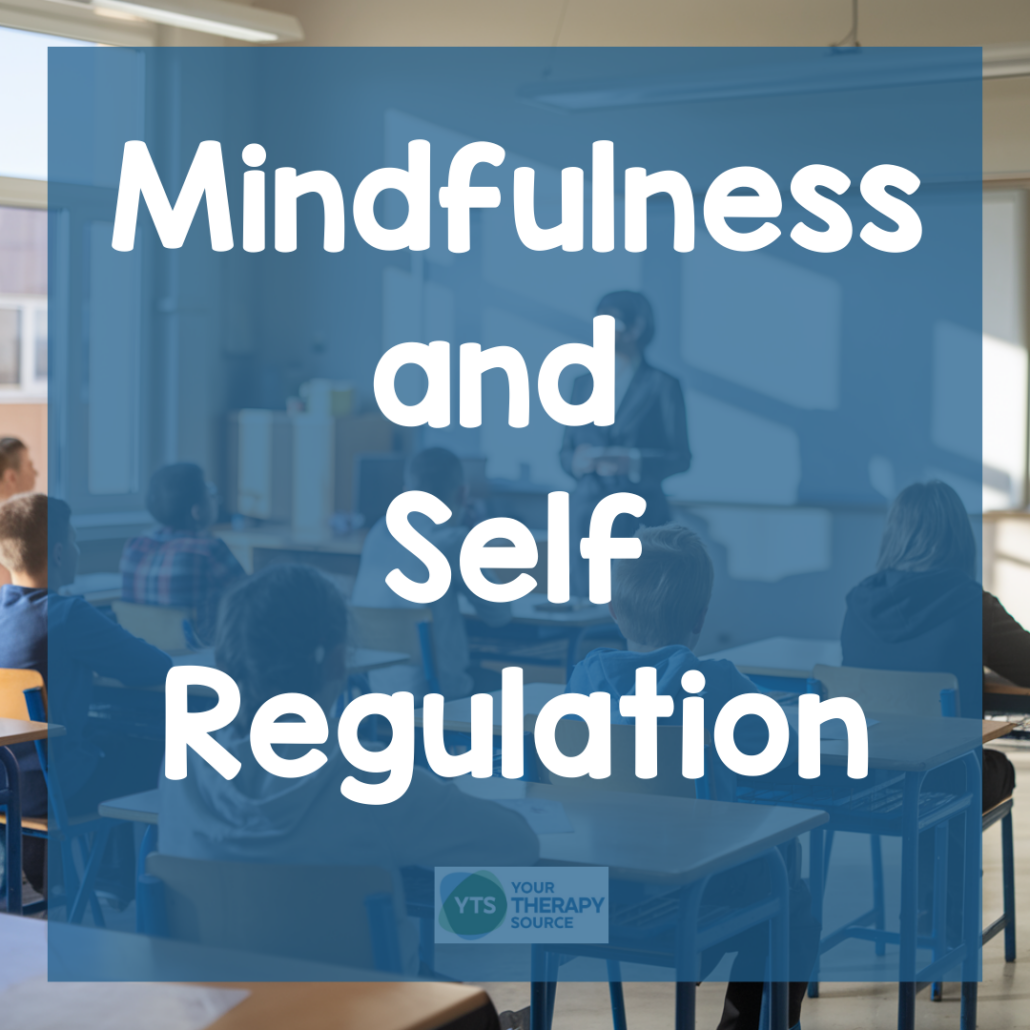Mindfulness and Self Regulation
Mindfulness for self regulation is a powerful tool that helps students manage emotions, improve focus, and build resilience. By practicing mindfulness techniques, students can learn to navigate big feelings, enhance emotional intelligence, and strengthen self-regulation skills. When students engage in mindfulness exercises, they train their brain to stay in the present moment and develop better control over their emotional reactions. Learn more about the practice of mindfulness and self regulation.
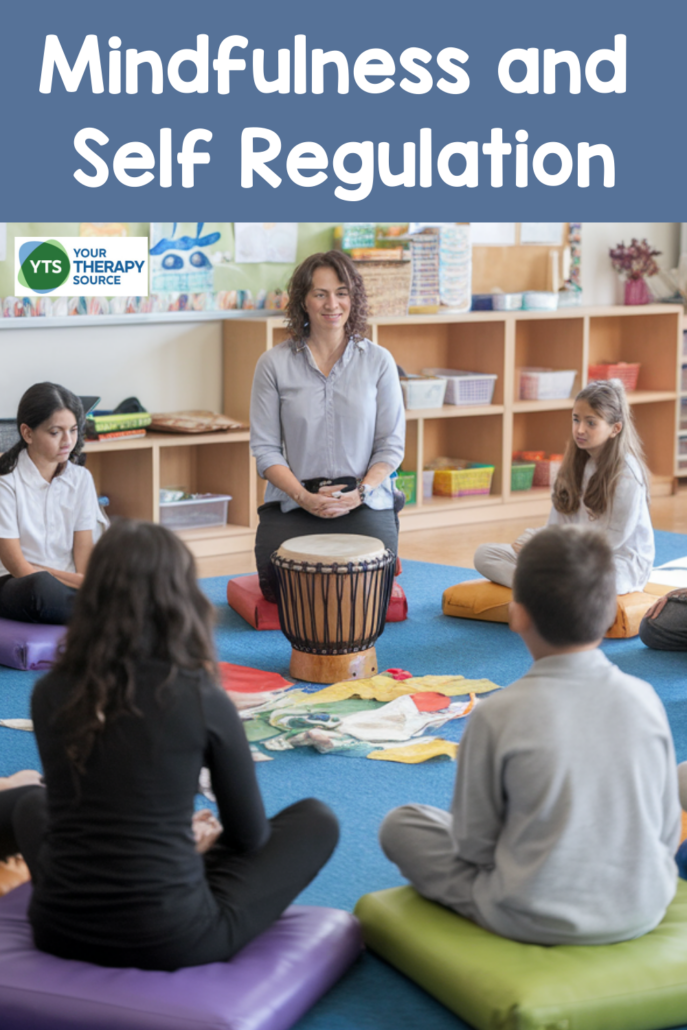
How Is Using Mindfulness Helpful?
Mindfulness is the practice of focusing on the present moment without judgment. It involves being aware of thoughts, feelings, and bodily sensations, allowing individuals to respond to situations with clarity rather than impulsivity. Self regulation refers to the ability to manage emotions, behaviors, and thoughts to achieve positive outcomes.
Mindfulness and self regulation are closely connected. Engaging in mindfulness practices strengthens the prefrontal cortex, the part of the brain responsible for impulse control, executive function, and emotional regulation. When students regularly participate in mindfulness-based interventions, they boost their ability to handle emotional distress, reduce negative emotions, and develop healthier emotional responses. Research studies show that mindfulness techniques, such as mindful breathing and meditation practice, can help students cope with challenging situations and improve overall mental health.
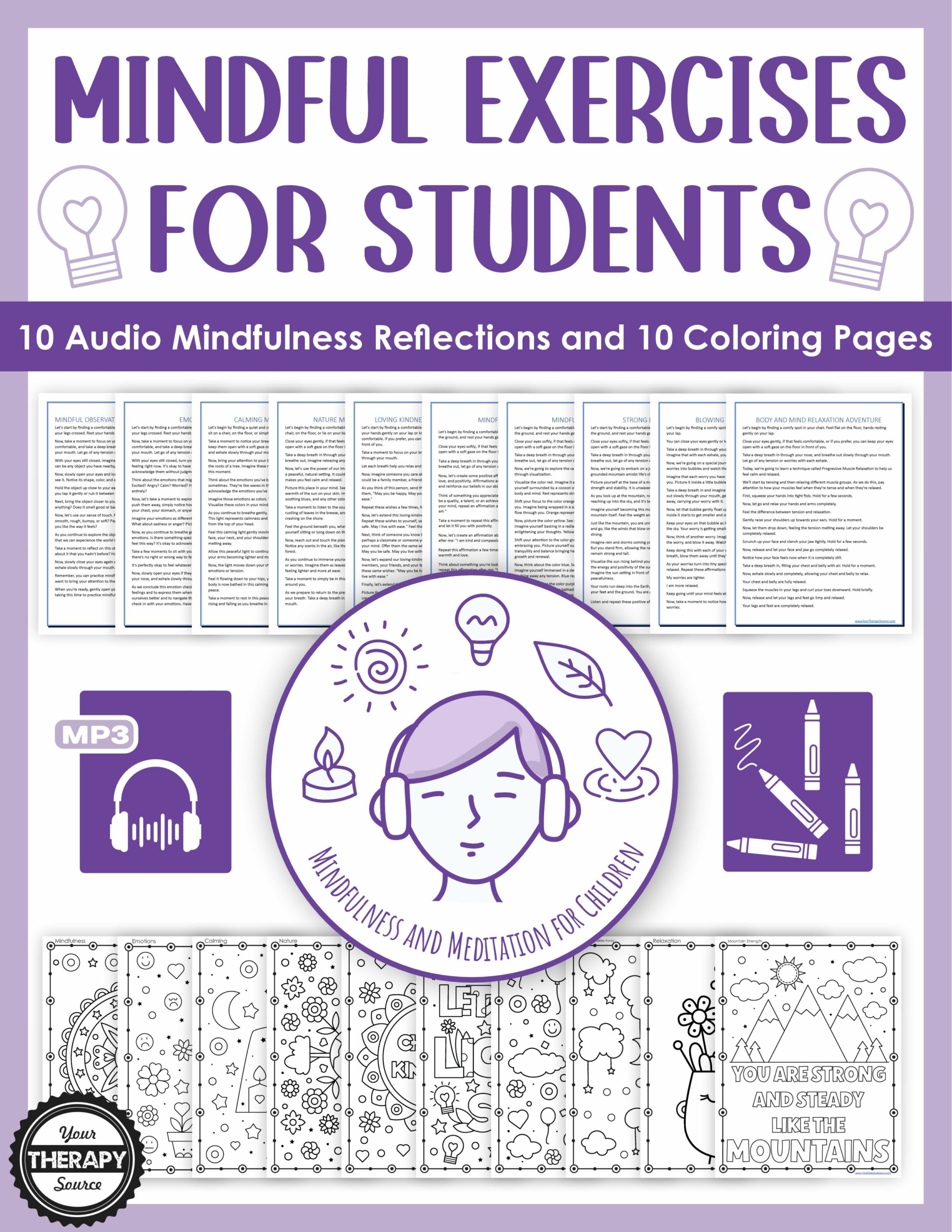
Mindful Exercises for Students
What Does the Research Say about Using Mindfulness for Self Regulation?
There are many research studies that report on the positive effects of mindfulness training on emotional self-regulation. Here are a few examples.
- A literature review of mindfulness-based programs found that students who participated in mindfulness interventions showed improvements in to improving cognitive performance and resilience to stress (Zenner et al, 2014).
- Another study highlights how mindfulness can support self-regulation in pre-adolescents by strengthening brain networks responsible for attention control and emotion regulation, which can lead to improved focus, emotional balance, and better long-term well-being (Kaunhoven & Dorjee, 2017).
- Research suggests that mindfulness practice supports healthy emotional regulation by reducing distress, improving emotional recovery, decreasing negative self-focus, and enhancing goal-directed behavior, though more experimental studies are needed to confirm its direct impact (Roemer, 2015).
- Mindfulness training has been shown to enhance executive control by improving cognitive flexibility, attention processing, and response inhibition, likely because it fosters present-moment awareness and nonjudgmental acceptance, which help individuals recognize when self-regulation is needed and effectively engage in control (Teper, 2013).
The practice of mindfulness can serve as a robust resource for emotional regulation, helping students cultivate self-care practices that benefit both their mental and physical health.
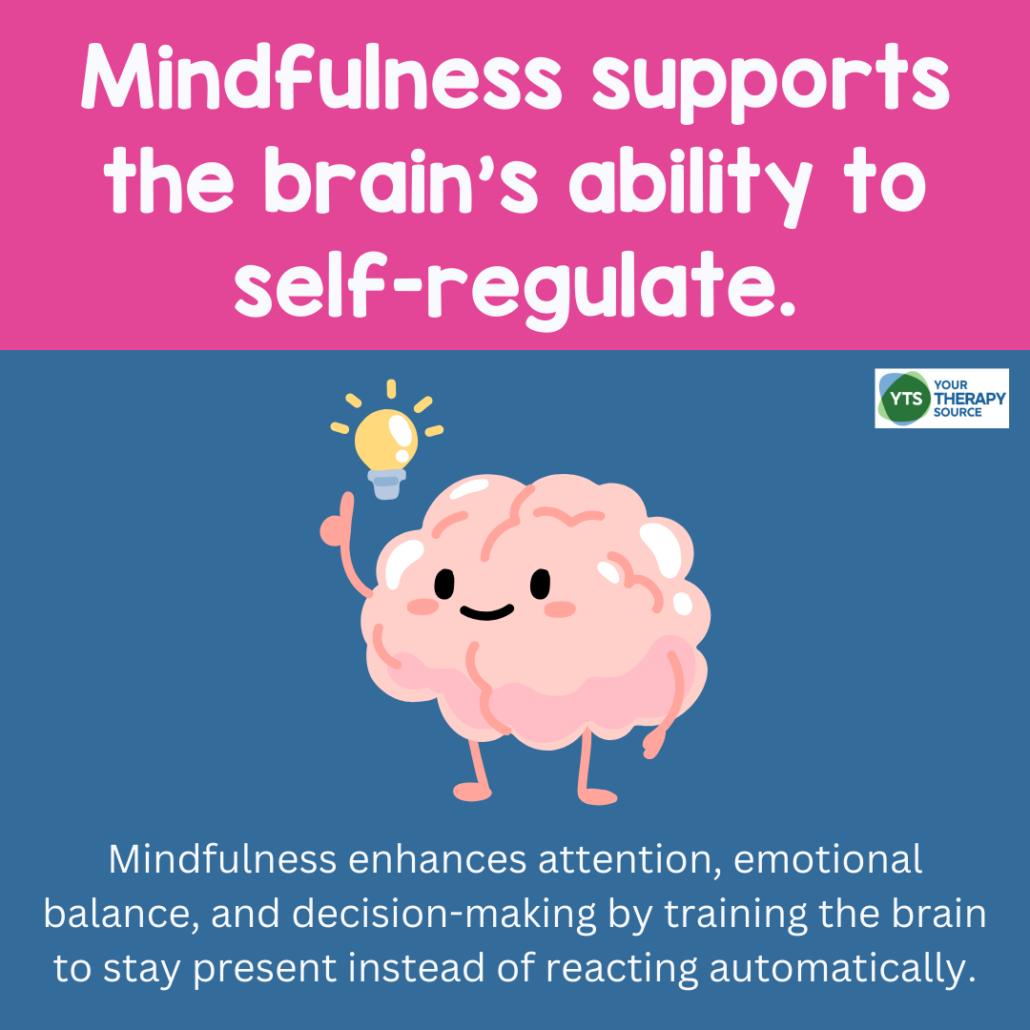
Mindfulness for Self Regulation Activities for School and Home
Integrating mindfulness exercises into daily activities can help students build stronger self-regulation skills. Ask your school counselors, occupational therapists, or physical therapists for more mindfulness ideas to incorporate into the classroom. Below are several mindfulness strategies that can be used in school and at home:
- 5-Minute Mindfulness Activities for the Classroom – These quick exercises help students reset their focus and manage emotions throughout the school day.
- 5 Senses Grounding Exercise – A simple way to bring attention to the present moment by engaging the senses.
- Finger Labyrinth Printable – A mindfulness technique that encourages relaxation and focus through repetitive finger tracing.
- Mindful Eating Worksheets – Helps students practice mindfulness by slowing down and engaging with their food.
- Mindfulness Activities for Kids – A collection of activities designed to support mindfulness training for young children.
- Body Scan Meditation for Kids – A guided meditation practice that promotes body awareness and relaxation.
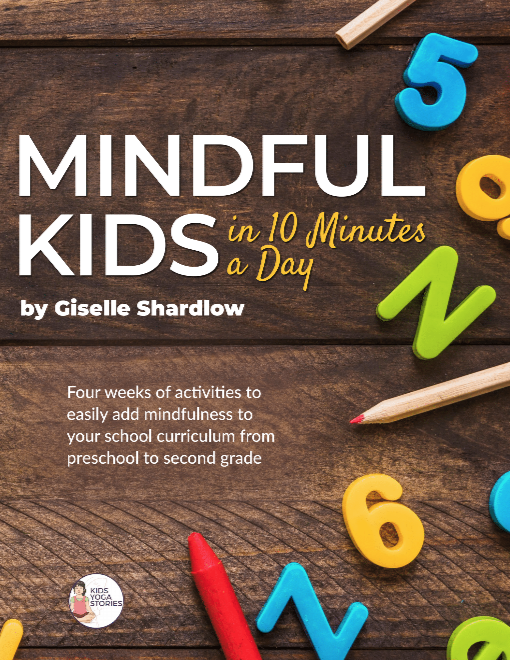
Mindful Kids in 10 Minutes a Day – PreK to 2nd Grade
Music, Mindfulness, and Self Regulation
Music is a powerful tool that can support mindfulness and self regulation. Certain types of music, such as calming instrumental tracks or nature sounds, can help students focus, reduce stress, and regulate their emotions. Research studies suggest that listening to soothing music can positively affect emotional states, cognitive function, and impulse control.
Using music as part of a mindfulness practice can help students develop better emotional awareness and relaxation skills. Mindfulness-based programs often incorporate music as a way to create a calming environment, enhance meditation practice, and improve emotional regulation. Whether through mindful listening, gentle movement to music, or relaxation exercises, incorporating music can provide a valuable tool for self-regulation.
Students and educators can explore a variety of mindfulness music resources, including this Mindfulness Music Playlist on YouTube. This playlist includes relaxing tracks designed to support mindfulness exercises, meditation, and emotional self-regulation.
By incorporating mindfulness techniques into daily routines, students can improve their ability to regulate emotions, build positive habits, and develop skills that support mental well-being. Practicing mindfulness-based interventions consistently fosters a stronger connection between brain processes, leading to better emotional regulation and enhanced cognitive function. Through mindful practices, students gain valuable tools to navigate their emotional states and respond to difficult situations with greater ease.
Key Points about Using Mindfulness for Self Regulation
- Research supports mindfulness as a tool for supporting self-regulation, cognitive flexibility, and emotional balance (Zenner et al., 2014; Kaunhoven & Dorjee, 2017).
- Regular mindfulness practice strengthens brain regions responsible for impulse control, emotional regulation, and attention management.
- Simple mindfulness exercises, such as mindful breathing and grounding techniques, help students manage emotions and reduce anxiety in everyday situations.
- Mindfulness strategies can be easily integrated into school and home routines to support positive behaviors and self-awareness.
- Practicing mindfulness encourages students to respond thoughtfully rather than react impulsively in challenging situations.
- Music-based mindfulness activities can enhance focus, reduce stress, and improve emotional well-being.
By incorporating mindfulness techniques into daily routines, students can improve their ability to regulate emotions, build positive habits, and develop skills that support mental well-being. Practicing mindfulness-based interventions consistently fosters a stronger connection between brain processes, leading to better emotional regulation and enhanced cognitive function. Through mindful practices, students gain valuable tools to navigate their emotional states and respond to difficult situations with greater ease.
References
Kaunhoven, R. J., & Dorjee, D. (2017). How does mindfulness modulate self-regulation in pre-adolescent children? An integrative neurocognitive review. Neuroscience & Biobehavioral Reviews, 74, 163-184.
Roemer, L., Williston, S. K., & Rollins, L. G. (2015). Mindfulness and emotion regulation. Current Opinion in Psychology, 3, 52-57.
Teper, R., Segal, Z. V., & Inzlicht, M. (2013). Inside the mindful mind: How mindfulness enhances emotion regulation through improvements in executive control. Current Directions in Psychological Science, 22(6), 449-454.
Zenner, C., Herrnleben-Kurz, S., & Walach, H. (2014). Mindfulness-based interventions in schools—a systematic review and meta-analysis. Frontiers in psychology, 5, 603.
